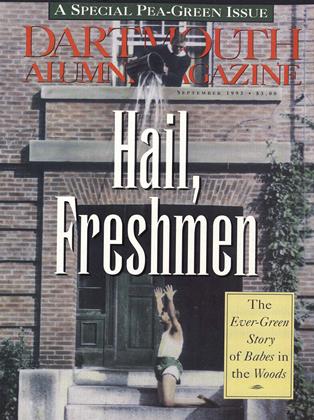Some Failure
As an old Ledyard Loyalist I was pleased to see the portrait of my mentor grace the cover of the Summer DAM. Pride soon turned to dismay, however. "Prodigal Son"? Ledyard was never able to rub two nickels together. "One of history's greatest failures"? He was the first Dartmouth student to recognize the opportunities of the great outdoors (a forerunner of Fred Harris '11, who founded the DOC). Ledyard was the first to bring drama to Dartmouth (a forerunner of Warner Bentley and others), and the first to go on term leave. All three of these pioneer efforts stand today, two centuries later, as hallmarks of the unique Dartmouth experience.
Following Dartmouth Ledyard became the first author to have a book copyrighted in America; the first white American to set foot on the West Coast of North America; the first American to recognize the pos- sibilities for fur trade which John Jacob Astor followed through on years later. Ledyard traveled farther on land than any other person of his genera- tion, and farther than most people by sea. He also planted the seed for the famous Lewis and Clark expedition to the Northwest. Ledyard was, no doubt, the first American to hike 1,000 miles up and around the Gulf of Bothnia—in winter no less. He kept extensive journals and was a keen observer of the customs of native peoples. He was one of the first to suggest that American Indians originally migrated from Asia.
If all the above represents "failure" as mentioned on the magazine cover, what then is success? As Cavafey's epic poem "Ithaca" reveals, it is the striving toward the destination that is important, not the arrival.
Shame upon the DAM for resorting ing to tabloid journalism to catch the reader's eye. In addition to the front cover, such expressions as "a disappearing act," "a gaudy apparition," "an ingominous death," and "vomit" are simply examples of cheap, sensationalized verbiage unworthy of the magazine. And what about an entire page picturing a black sheep? A crude attempt at unspoken symbolism? Maybe, just maybe, our impish editor inserted these shock words simply to increase the number of letters to the DAM. If so, watch out Eleazar. Black Dan, Hoppy, Rocky, and, yes, even the now legendary John Sloan Dickey.
Etna, New Hampshire
Selective Morality
Your recent cynical comments on The Dartmouth Review ["On the Hill," Summer] were disappointing—and predictably wide of the mark.
Having spent seven years as legal council and director of institutional affairs at a leading New England college (which, for the purposes of this letter, will be kept anonymous) before returning to private industry, I can say with conviction that the Review is more in touch with the "real world" than Dartmouth faculty and administrators. The Review has done great service in exposing an institutionhigher education in general, Dartmouth in particular—fully deserving of challenge and scrutiny.
For an administration and alumni magazine to dismiss so lightly and condescendingly the freedom of speech and theft issues inherent in the episode involving confiscation of Review newspapers speaks volumes about the selective morality that continues to plague Dartmouth and so many other colleges and universities. Anyone with any understanding of the atmosphere that overwhelms these institutions, where one's racial, political, or sexual grouping is valued over individualism, knows' very well that Dartmouth's position on this issue would be 180 degrees different were the group in question of another minority persuasion—black, gay, or lesbian as opposed to conservative.
Glastonbury, Connecticut
Editorial Note
Mr. Lips wasn't the only one who took us to task for the editor's "On the Hill" comment in the Summer issue, "The Review's Bedfellows Get Stranger." So did the Dartmouth administration. For one thing, we got the chronology wrong: the policy toward dormitory distribution of publications was announced before The Dartmouth Review demanded more active protection. We apologize for the error.
The administration also pointed to its growing emphasis on letting students solve their own differences. After a talk with Dean of Students Lee Pelton, Amiri Barksdale '96 and friends stopped picking up the paper in the dorms. While we admire this Let-students-teach-each-other attitude, we do wish the administration would use its pulpit more aggressively. Dartmouth is one of the few top schools that allow publications to distribute in bulk to the dormitories. Rather than merely stating a legalistic policy comparing the Review with "litter," the administration might have uttered a few stern words about the Bill of Rights. Such a timely sermon would have served the College's educational purpose nicely, while proving a commitment to free speech that has existed all along.—Ed.
 View Full Issue
View Full Issue
More From This Issue
-
 Feature
FeatureI Was A Freshman Trip Spy
September 1993 By Todd Balf -
 Feature
FeatureFifty-Five Out
September 1993 By Judson D. Hale '55 -
 Feature
FeatureThe Next Bus Home
September 1993 By Regina Barreca '79 -
 Feature
FeatureThe First Year
September 1993 -
 Feature
FeatureHow Do You Socialize a Freshman?
September 1993 By Heather Killebrew '89 -
 Cover Story
Cover StoryThey have been called freshies, Pea Greeners, shmen a current phrase that cannot be uttered without sneering.
September 1993







